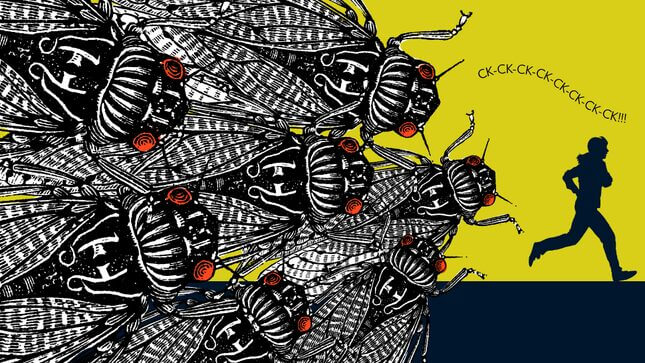How to Roll Out the Welcome Wagon for Your New Cicada Neighbors
Latest

As you probably know by now, the East Coast is on its way to being hit by a massive cicada invasion. They’ve already started crawling out out the earth in Staten Island and won’t stop crawling out of the earth until the sky is darkened by billions (literally billions) of them. If you live in this part of the world, then it’s likely that you’ll find yourself coming into frequent contact with the insect. In fact, you might even find yourself sharing a living space with one.
Keep in mind that this is a hard situation for the both of you — you don’t like being under siege by giant bugs and they don’t like anything that’s not having loud sex with other cicadas. Unfortunately, you’re going to have to be the responsible being and step into the role of educator here. Your new cicada neighbors have been underground for seventeen years, living with a brood that has its own way of life that’s probably very strange to us. Think about how you’d want to be treated if you were visiting the cicada underworld and now try to extend those same courtesies to our winged guests.
Remember: Their ways aren’t weird or wrong, they’re just different.
If welcoming the cicadas with open arms is still confusing for you, don’t worry about it. We humans have been sharing the planet with one another for hundreds of thousands of years now and we still have a hard time accepting each other, so it makes sense that you’d struggle with embracing an entirely new species. Regardless, you should do your best not to be closed minded and to always be kind.
Here’s a handy guide to help you learn to accept and welcome your cicada summer guests.
1. Learn a few basic cicada phrases.
Sure, they’re on our turf and they should learn to use human language, but think of how excited they feel when instead of screaming “Get the fuck off me!” you instead yell “CK-CK-CK-CK-CK-CK-CK-CK-CK-CK-CK-CK.” Haven’t you ever met someone who spoke your language when you were abroad and feeling lost? It’s a wonderfully comforting experience. Why not give a similar gift to the cicadas?
2. If a cicada offends you, it’s probably an accident.
I spent a period of my high school years living in Rome. Right after I had first moved there — when I barely spoke Italian — I accidentally offended my friend Roberto by jokingly calling him stupid. What I didn’t realize at the time was that, while in America “stupid” is a fairly innocuous insult, it’s actually considered a super shitty thing to call someone in Italy. Luckily, he was very forgiving of my misunderstanding and let it go.
-

-

-

-

-

-

-

-

-

-

-

-

-

-

-

-

-

-

-

-

-

-

-

-

-

-

-

-

-

-

-

-

-

-

-

-

-

-

-

-








































